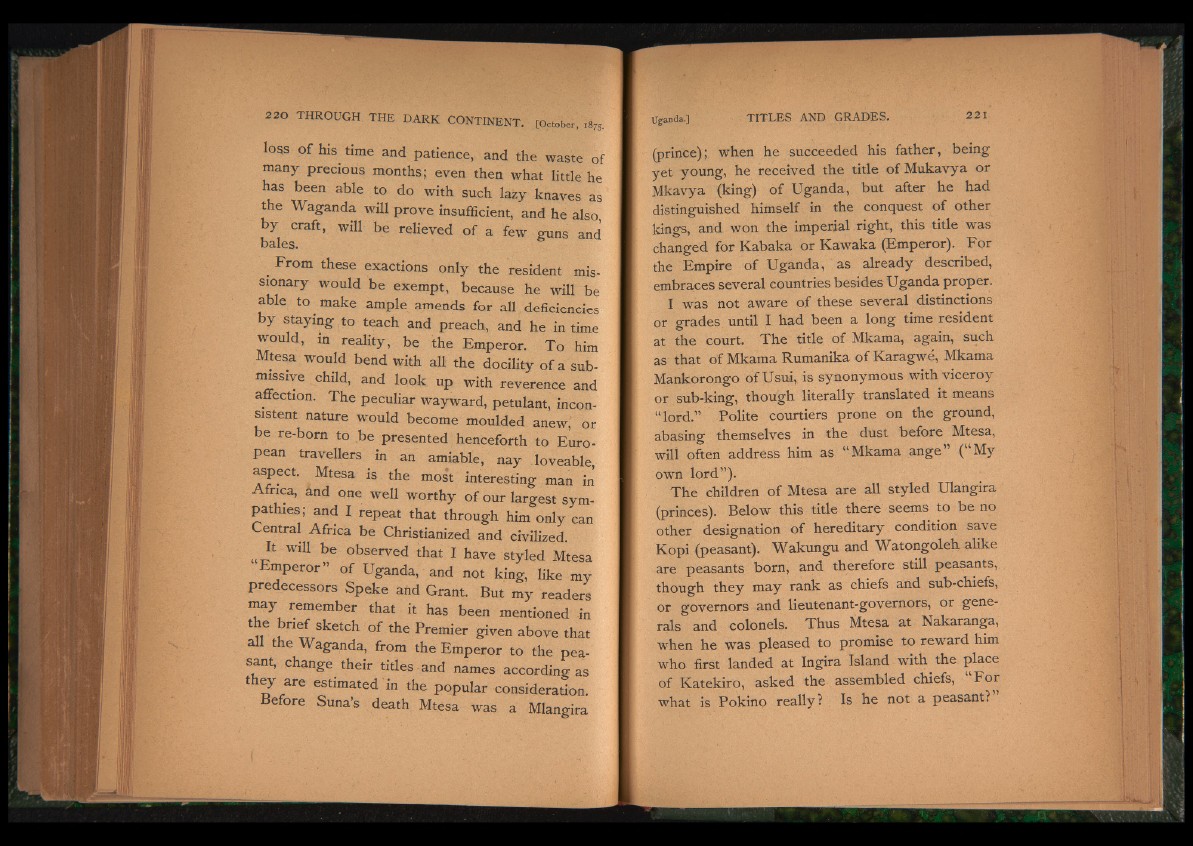
loss o f his time and patience, and the waste of
many precious months; even then what little he
has been able to do with such lazy knaves as
the Waganda will prove insufficient, and he also
b y craft, will be relieved o f a few guns and
bales.
From these exactions only the resident missionary
would be exempt, because he will be
able to make ample amends for all deficiencies
b y staying to teach and preach, and he in time
would, in reality, be the Emperor. T o him
Mtesa would bend with ah the docility o f a sub-
missive child, and lo o k up with reverence and
affection. T h e peculiar wayward, petulant, inconsistent
nature would become moulded anew, or
be re-born to be presented henceforth to European
travellers in an amiable, nay loveable,
aspect. Mtesa is the mos’t interesting man in
Africa, and one well worthy o f our largest sympathies;
and I repeat that through him only can
Central Africa be Christianized and civilized.
It wiH be observed that I have styled Mtesa
Emperor” o f Uganda, and not king, like my
predecessors Sp ek e and Grant. But my readers
may remember that it has been mentioned in
the b rief sketch o f the Premier given above that
all the Waganda, from the Emperor to the peasant,
change their titles , and names according as
t e y are estimated in the popular consideration.
Before Suna’s death Mtesa was a Mlangira
(prince); when he succeeded his father, being
yet young, he received the title of Mukavya or
Mkavya (king) o f Uganda, but after he had
distinguished himself in the conquest o f other
kings, and won the imperial right, this title was
changed for Kabaka or Kawaka (Emperor). For
the Empire o f Uganda, as already described,
embraces several countries besides Uganda proper.
I was not aware o f these several distinctions
or grades until I had been a long time resident
at the court. T h e title o f Mkama, again, such
as that o f Mkama Rumanika o f Karagwe, Mkama
Mankorongo o f Usui, is synonymous with v ice roy
or sub-king, though literally translated it means
“ lord.” Polite courtiers prone on the ground,
abasing themselves in the dust before Mtesa,
will often address him as “ Mkama an g e ” (“ My
own lo rd ” ).
T he children o f Mtesa are all s ty led Ulangira
(princes). Below this title there seems to be no
other designation o f hereditary condition save
Kopi (peasant). Wakungu and Watongoleh alike
are peasants born, and therefore still peasants,
though th ey may rank as chiefs and sub-chiefs,
or governors and lieutenant-governors, or generals
and colonels. Thus Mtesa at Nakaranga,
when he was pleased to promise to reward him
who first landed at Ingira Island with the place
o f Katekiro, asked the assembled chiefs, “ F o r
what is Pokino really? . Is he not a peasant?